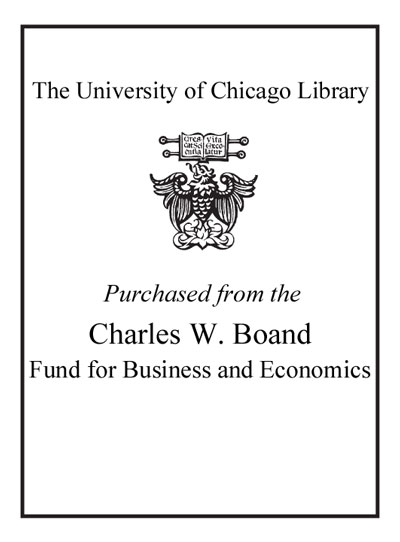Exploitation and economic justice in the liberal capitalist state /
Saved in:
| Author / Creator: | Reiff, Mark R., 1957- |
|---|---|
| Imprint: | Oxford : Oxford University Press, c2013. |
| Description: | x, 348 p. : ill. ; 24 cm |
| Language: | English |
| Subject: | |
| Format: | E-Resource Print Book |
| URL for this record: | http://pi.lib.uchicago.edu/1001/cat/bib/9129475 |
Table of Contents:
- Introduction
- 1. Exploitation and Justice
- 1.1. Exploitation and Marx
- 1.2. Exploitation after Marx
- 1.3. Exploitation as a Liberal Egalitarian Theory of Distributive Justice
- 2. Exploitation and the Just Price
- 2.1. The Just Price in the Ancient World
- 2.2. The Just Price in the Medieval World
- 2.3. The Just Price in the Renaissance, the Age of Enlightenment, and on into the Modem World
- 2.4. What the History of Just Price Theory Has to Tell Us About Exploitation
- 3. The Limits of Exploitation
- 3.1. Gifts
- 3.2. Commodification
- 3.3. Contraband
- 3.4. Capacity
- 3.5. Voluntariness
- 3.6. Value
- 4. What Price is Just?
- 4.1. Market Price vs Cost of Production
- 4.2. Accounting vs Economic Cost
- 4.3. Marginal vs Average Total Cost
- 4.4. Private vs Social Cost
- 4.5. Accounting for Time
- 4.6. Calculating the Cost of Labor
- 4.6.1. Subsistence and Contextual Basic Needs
- 4.6.2. When Compensation is Excessive
- 5. Exploitation and Intolerable Unfairness
- 5.1. The Scope of the Principle of Toleration
- 5.2. Three Reasons for Toleration
- 5.3. Toleration and Sales below the Just Price
- 5.4. Toleration and Sales above the Just Price
- 5.4.1. The First Level of Tolerable Unfairness
- 5.4.2. The Second Level of Tolerable Unfairness
- 5.4.3. Intolerable Unfairness
- 5.5. Toleration and Innovation
- 5.5.1. The Investor and the Entrepreneur
- 5.5.2. The Problem of Skew
- 5.5.3. The Definition of "Goods"
- 5.6. The Nature and Role of Profit
- 6. Implementation and Enforcement
- 6.1. The Indeterminacy of the View from Nowhere
- 6.2. The Minimum Wage and Unemployment
- 6.3. The Maximum Wage and the Flight of the Talented
- 6.4. Minimum Prices and Public and Private Goods
- 6.5. Maximum Prices and the Redistribution of Excess Profits
- 6.6. The Fear of Full Employment and Inflation
- 6.7. Maximum Profitability and the Recognition of Income
- 6.8. Exploitation and the Estate and Gift Tax
- 6.9. Exploitation and Speculation
- 6.10. Exploitation and Arbitrage
- 6.11. Exploitation and Climate Change
- 7. The Prospects for an Overlapping Consensus
- 7.1. Exploitation and Libertarianism
- 7.1.1. The Place of the Just Price in the Structure of Libertarian Thought
- 7.1.2. Self-Ownership, Equal Liberty, and Negative Liberty
- 7.2. Exploitation and Luck Egalitarianism
- 7.3. Exploitation and the Difference Principle
- 7.4. Exploitation, Equality of Opportunity, and the Demographics of Inequality
- References
- Index

